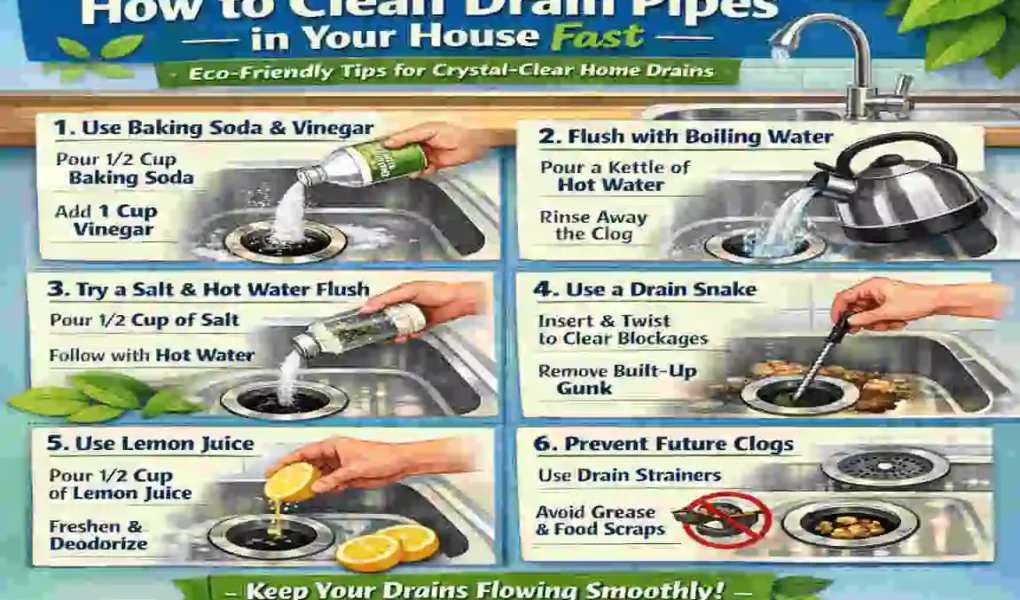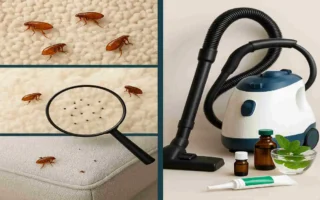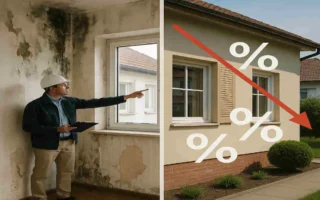Have you ever stood in the shower only to realize you are ankle-deep in lukewarm, soapy water? Or perhaps you’ve finished doing the dishes, pulled the plug, and watched—exhausted—as the water sits there, swirling lazily but going nowhere. We have all been there. It is one of those minor household frustrations that can quickly turn into a major headache.
When this happens, your first instinct might be to run to the store and grab the brightest, most aggressive-looking bottle of chemical drain cleaner you can find. But wait! Before you pour those harsh toxins down your sink, let’s talk about the hidden costs. Those chemicals don’t just “melt” the clog; they can eat away at your pipes, kill the beneficial bacteria in your septic system, and eventually find their way into our precious waterways.
Why Drains Clog Fast: The Hidden Culprits in Your Pipes
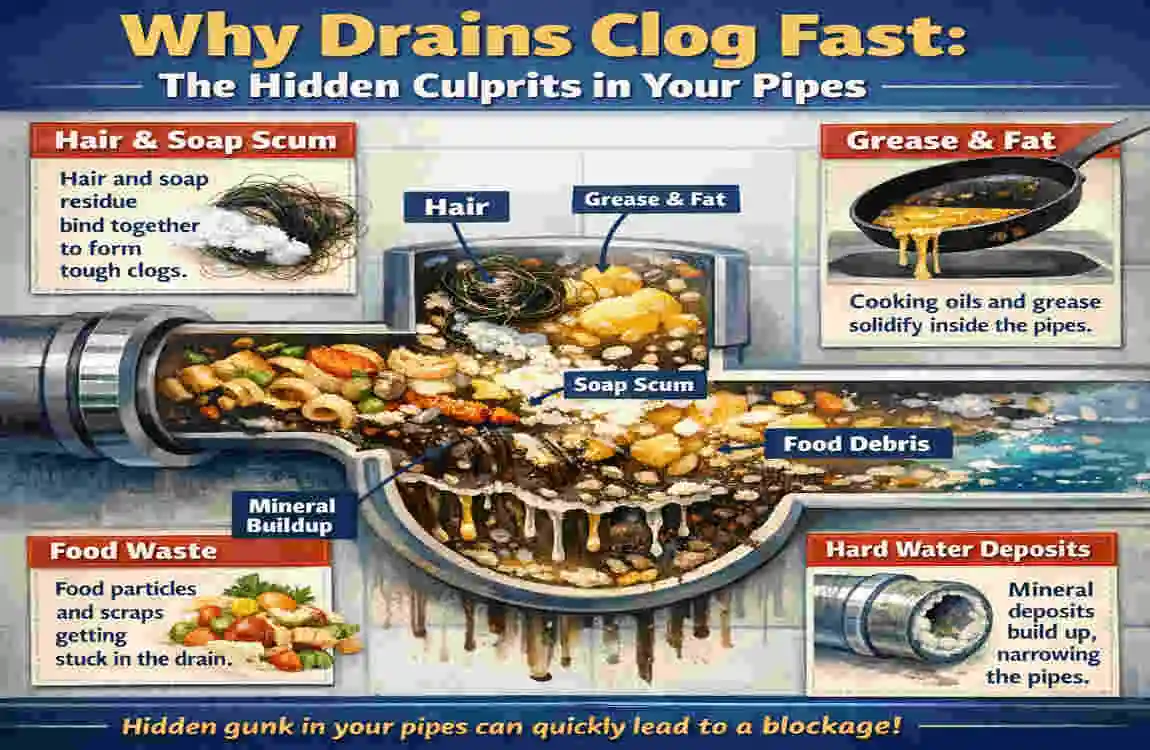
To fix a problem permanently, you first have to understand why it is happening. Most of us think of a clog as a single “object” stuck in the pipe. Still, it’s usually a slow buildup of several different materials working together to create a stubborn barrier.
Common Culprits in the Kitchen and Bathroom
In the kitchen, the number one enemy is FOG—Fats, Oils, and Grease. When you pour warm grease down the sink, it looks like a liquid. However, as soon as it hits the cool metal of your underground pipes, it solidifies into a waxy, thick sludge. This sludge then acts like glue, catching every little food scrap or coffee ground that follows it.
In the bathroom, the story is a bit different. Here, the primary offenders are hair and soap scum. Human hair is surprisingly strong and doesn’t decompose easily. When it tangles with the sticky residue left behind by traditional bar soaps, it forms a “net” that eventually blocks all water flow.
The Real Risks of Ignoring a Slow Drain
You might think a slow drain is just a nuisance, but ignoring it can lead to serious structural issues. When water sits in your pipes, it creates constant pressure on the joints. Over time, this can lead to leaks or even a full pipe burst. Furthermore, standing water is a breeding ground for bacteria and mold, which can release unpleasant odors and impact your home’s air quality.
The Eco-Friendly Advantage
Natural cleaning methods focus on breaking down the organic matter without corroding the pipe itself. While chemical cleaners use heat-generating reactions that can warp PVC pipes or crack old clay pipes, eco-friendly solutions like enzymes and manual tools keep your infrastructure intact while protecting the environment.
Table: Common Clog Types and Their Risks
Room Main Culprits Eco-Risk if Uncleaned Best Natural Fix
Kitchen Grease, food scraps, coffee grounds Bacterial growth & foul odors Boiling water & dish soap
Bathroom Hair, toothpaste, soap scum Mold and mildew buildup Plunger or Vinegar/Soda
Laundry Lint, detergent buildup, microplastics Overflow and flooring damage Manual Snake/Auger
Outdoor Leaves, dirt, mineral deposits Foundation water damage Enzyme cleaners
The Boiling Water Flush
If you are looking for the absolute fastest way to tackle a minor clog, look no further than your tea kettle. The boiling water flush is the “low-hanging fruit” of drain cleaning. It is simple, free, and incredibly effective for clogs caused by grease or soap.
Why It Works
Think about what happens to butter when you put it in a hot pan—it melts instantly. The same principle applies to your pipes. The high water temperature liquefies the hardened fats and oils, allowing them to flow through the system and into the main sewer line.
How to Do It Safely
- Boil a whole kettle or a large pot of water.
- Pour it slowly down the drain in two or three stages. This allows the hot water to work on the clog for a few seconds between pours.
- Wait. If the water starts to go down, follow it up with a bit of cold water to ensure everything has moved through.
A Word of Caution: If you have PVC (plastic) pipes, do not use boiling water. Extremely hot water can soften the plastic or weaken the glued joints. In this case, use very hot tap water instead of boiling water from a stove.
Pro Tip for Kitchen Sinks
If your kitchen sink is draining slowly due to grease, add a generous squirt of grease-cutting dish soap to the drain before pouring in the boiling water. The soap helps break the molecular bond of the grease, making the flush even more effective.
The Baking Soda and Vinegar Volcano

This is the most famous DIY cleaning hack in the world. It uses introductory chemistry to create a physical reaction that “scrubs” the inside of your pipes without you having to lift a finger.
The Science of the Fizz
When you mix baking soda (a base) with vinegar (an acid), a chemical reaction occurs that produces carbon dioxide gas. This “fizzing” action creates pressure and agitation inside the pipe, helping break up the “gunk” that holds a clog together.
Step-by-Step Instructions
- Step 1: Pour about half a cup of baking soda down the dry drain. Try to get as much as possible inside the pipe rather than just sitting on the strainer.
- Step 2: Follow it with half a cup of white distilled vinegar.
- Step 3: Immediately cover the drain with a plug or a heavy cloth. This forces the “volcano” reaction downward into the clog rather than up into the sink.
- Step 4: Let it sit for at least 30 minutes. For very stubborn clogs, you can even leave it overnight.
- Step 5: Flush the drain with a gallon of hot water to clear away the loosened debris.
Variations for Freshness
If your drain smells like a swamp, try adding a bit of lemon juice to the vinegar. The citric acid provides extra cleaning power, and the scent will leave your kitchen or bathroom smelling fresh and clean.
Pros and Cons of the Vinegar Method
Pro Con
Incredibly cheap (less than $1 per use) Not effective for solid objects (like toys)
Safe for all pipe types and septic tanks Requires a 30-minute waiting period
Kills odor-causing bacteria May require multiple attempts for heavy grease
The Power of the Plunger
We often associate plungers with toilets, but they are actually among the most effective tools for cleaning out drain pipes in the house, especially in sinks and tubs. This is a 100% mechanical solution—no liquids required!
Choosing the Right Tool
Did you know there are different types of plungers?
- The Cup Plunger: This looks like a simple rubber bowl. It is designed for flat surfaces, such as sinks and bathtubs.
- The Flange Plunger: It has an extra rubber sleeve at the bottom. It is specifically designed to fit into the hole of a toilet to create a seal.
How to Get a Perfect Seal
To clear a sink clog, you need a vacuum. If you have a double sink in the kitchen, you must seal the other drain with a wet rag or a stopper. If you don’t, the air will escape out the other side, and you won’t create any suction.
Fill the sink with just enough water to cover the plunger head. Position the cup over the drain, push down slowly to release the air, then pull it up and down vigorously for about 15 seconds. The sudden change in pressure often dislodges hair clogs instantly.
Biological Enzyme Cleaners
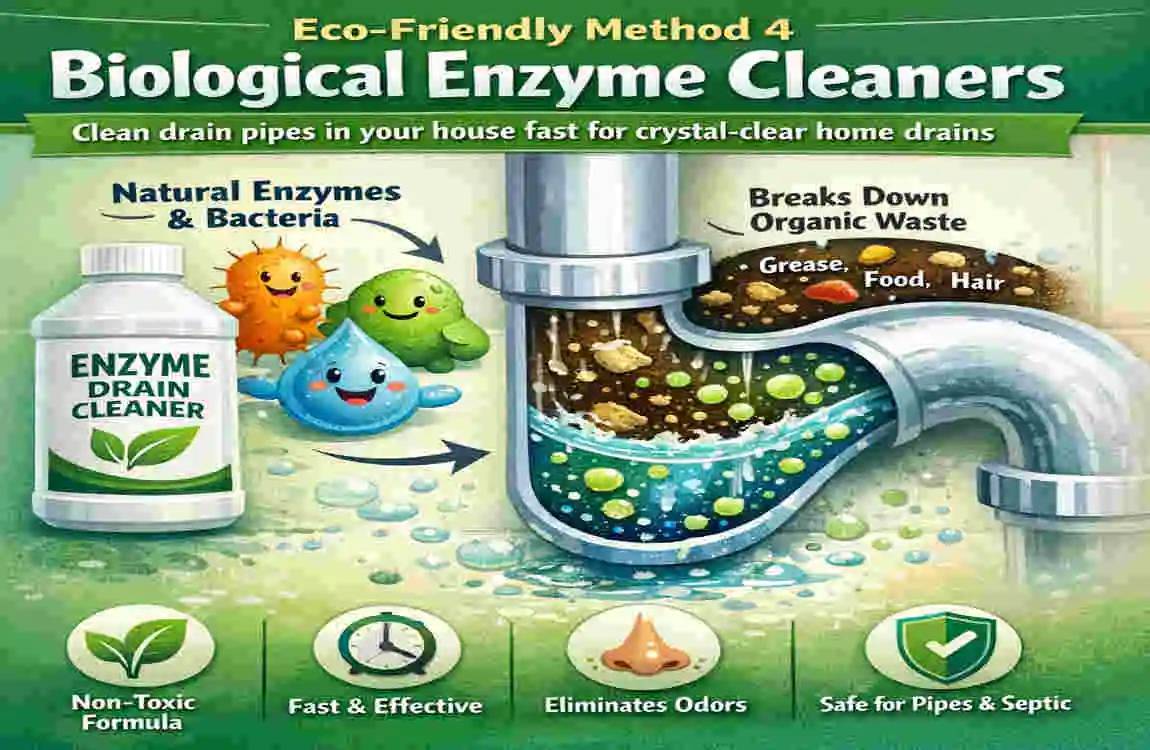
If you have recurring clogs or want to maintain your pipes long-term, enzyme cleaners are your best friend. Unlike harsh chemicals that “burn” through waste, enzymes are living organisms (bacteria) that literally “eat” organic matter.
How They Work
Think of enzymes as tiny “Pac-Men” for your plumbing. They target organic materials like hair, food, and paper. Once they find the waste, they break it down into water and carbon dioxide. Because they are biological, they are completely safe for septic systems and won’t damage your pipes, regardless of age.
Application Tips
- Apply at night: Enzymes work slowly. They need time to “colonize” the clog. Pour the recommended amount down the drain before you go to bed.
- Don’t use water: Avoid running the faucet for 6-8 hours after application to prevent bacteria from being washed away.
- Consistency is key: Using an enzyme cleaner once a month can prevent 90% of common household clogs from ever forming.
Using a Drain Snake or Auger
Sometimes, a clog is just too solid or too deep for liquids to reach. This is when you need to get physical. A drain snake (also known as a plumber’s auger) is a flexible coil of metal that you feed into the pipe.
When to Use a Snake
If you have a “total blockage” where no water is moving at all, a snake is usually the best eco-friendly option. It allows you to reach 10 to 25 feet into your plumbing system to pull out hairballs or break up solid obstructions.
How to Snake a Drain Like a Pro
- Remove the strainer or the pop-up stopper from your sink or tub.
- Insert the snake tip into the drain and turn the handle clockwise.
- Push gently. When you feel resistance, you’ve likely hit the clog. Continue cranking to “hook” the material.
- Pull it back. Slowly retrieve the snake. Be prepared—what comes out is usually pretty gross (lots of hair and grey sludge), but it means the job is done!
- Flush. Run hot water for a few minutes to clear any remaining small bits.
Prevention Hacks for a Clog-Free Home

The best way to clean out drain pipes in house is to make sure they never get dirty in the first place! Prevention is the ultimate “green” strategy because it saves resources and prevents emergencies.
Install Mesh Screens
This is the single most effective thing you can do. For about $5, you can buy stainless steel mesh strainers for every drain in your house. They catch hair, bits of soap, and food scraps before they ever enter your pipes. You dump the contents into the trash or compost once a day.
The “No Grease” Rule
Never, ever pour liquid fat or cooking oil down the sink. Even if you follow it with hot water, it will eventually cool down and cause a blockage. Instead, keep an old glass jar under the sink. Pour your grease into the jar, let it solidify, and throw it in the trash.
Weekly Maintenance Routine
Make it a habit to do a “mini-clean” every weekend.
-
- List of Weekly Habits: Pour one kettle of hot water down the kitchen sink.
- Pull hair out of the bathroom pop-up stopper.
- Use a handful of baking soda and a quick splash of vinegar to keep things smelling fresh.
Advanced Eco-Tips for Stubborn Clogs
What if you’ve tried the vinegar, the plunger, and the snake, and the water is still backing up? Don’t panic, and don’t reach for the chemicals yet.
The Mineral Soak
If you live in an area with hard water, your pipes might be restricted by calcium and magnesium buildup. This makes the “pipe” narrower, causing it to clog more easily. To fix this, you can do a prolonged vinegar soak. Pour a gallon of vinegar into the system and let it sit for 24 hours. Acidity slowly dissolves mineral scales.
Hydro-Jetting (The Professional Eco-Option)
If the clog is in your main sewer line, you might need a professional. Ask your plumber about hydro-jetting. Instead of chemicals, this process uses extremely high-pressure water to “pressure wash” the inside of your pipes. It removes everything—roots, grease, and minerals—leaving the pipes as clean as the day they were installed.
FAQs: Your Questions Answered
Q: How can I clean out drain pipes in my house overnight?A: The best overnight method is using enzyme cleaners. They are designed to work for 6 to 8 hours. Pour them in before bed and flush with hot water in the morning.
Q: Are these natural methods safe for old cast-iron pipes?A: Yes! In fact, natural methods are safer for old pipes. Harsh chemicals, such as sodium hydroxide, can cause old metal pipes to corrode and leak. Baking soda, vinegar, and enzymes are much gentler.
Q: Why does my drain still smell after I’ve cleared the clog?A: Odors often come from a buildup of “biofilm” (a layer of bacteria) on the walls of the pipe. Use the baking soda and vinegar method, but add essential oils like tea tree or eucalyptus to kill the bacteria and leave a pleasant scent.
Q: Can I use a vacuum to unclog a drain?A: Yes, if you have a wet/dry shop vac. You can create a seal over the drain and use the “suction” setting to pull the clog up and out. Just make sure the vent holes are covered!

